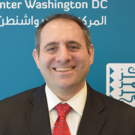Speakers

Lara Friedman
President
Foundation for Middle East Peace
Moderator
Event Summary
On November 22, Arab Center Washington DC (ACW) hosted a panel at its headquarters titled “US Policy Reversal on Israeli Settlements.” Speakers analyzed US Secretary of State Mike Pompeo’s recent pronouncement that Israeli settlements in occupied Palestinian territory are not deemed by the Donald Trump Administration as inconsistent with international law.
ACW’s Assistant Executive Director Tamara Kharroub, who moderated the session, said that this perceived shift in American policy can be analyzed by examining international law, the history of US policy toward Israel and Palestine, and the impact of the announcement on the ground. She introduced the three panelists: Jonathan Kuttab, a human rights lawyer and a nonresident fellow at ACW; Yousef Munayyer, executive director of the US Campaign for Palestinian Rights and an ACW nonresident fellow; and Lara Friedman, president of the Foundation for Middle East Peace.
Jonathan Kuttab offered perspectives from international law, saying that the text of the Geneva Conventions and its authoritative interpretations are clear in stipulating that an occupying power cannot move its own civilians into occupied areas. He enumerated some of the arguments that Israelis offer to justify their settlement building on the West Bank and provided a rebuttal for each of them. The overarching principle, he explained, is that according to international law, a country cannot take territory by force and then push indigenous civilians off the territory or move their own civilians there; this is a “bedrock” legal opinion that is absolutely clear and undisputed. The only significant argument Israeli governments continue to pursue is that they have created facts on the ground and they are there to stay, thus forcing the Palestinians and the international community to accept the status quo. This way Israeli governments focus on the “peace process” and ignore and undermine international law. Kuttab said that Israel is practically using civilians as tools and is basically following the “rule of the jungle.” For that reason, he believes, there should be adherence to international law that stipulates that states cannot rely on power alone but must revert to legal institutions and international values and principles.
Yousef Munayyer explained that Pompeo’s statement was a Republican Party effort to reverse previous Democratic Party policies. However, he noted, Pompeo’s pronouncement merely provided “a distinction without a difference in practice.” For example, in 2011 President Barack Obama vetoed a UN resolution stating that Israeli settlements are not legitimate. Munayyer also said that previous administrations were careful to avoid framing Israel’s settlement building in legal terms and viewed such activity as separate from the peace process, which is fundamentally problematic. As for the timing of Pompeo’s announcement, this is a sensitive time in Israeli politics, Munayyer noted; after two elections, neither Benjamin Netanyahu nor Benny Gantz have been able to form a government. He described Trump’s actions, such as recognizing Jerusalem as Israel’s capital and the latter’s sovereignty over the Golan Heights, as “gifts” that strengthen Netanyahu’s position. Pompeo’s latest pronouncement, Munayyer argued, paves the way for settlement expansion and eventual annexation of the West Bank. On the other hand, he said, these policies have widened the chasm between the United States and Europe, thus opening a window for Palestinians to engage with European partners. These policies have also created more sympathy for Palestinians among progressive leftists in the United States and an opening for presidential candidates to talk about Palestinian rights. He said the civil society approach, for example the Boycott, Divestment, and Sanctions (BDS) movement, is one promising tool—a long-term strategy—to push for implementation of international law. Munayyer also argued that the “two-state solution” represents a theoretical space in which many in the United States and the international community are hiding—whereas the reality on the ground is that of one state.
Lara Friedman started her remarks by noting that conversations about Trump and his policies continue to consider his administration “normal or pragmatic.” She noted that Trump and his team have been extremely clear and coherent in their plans, since before they took office. To Friedman, international law is irrelevant to the Trump Administration; the land belongs to Israel, and Palestinians are illegitimate. Over the last three years, the Trump Administration has upended many of the principal issues of the Israeli-Palestinian conflict: they have taken refugees and Jerusalem off the table, reduced Palestinians to a people who live under Israeli authority, and cut the representation of Palestinians in Washington and removed them as negotiating partners. What is left now, she continued, is the land: Israel sees keeping the West Bank as its right, in the same way it annexed the Golan Heights. In her recent visit to Palestine and Israel, Friedman said that talk about annexation is forcing discussion about apartheid, that the discourse is shifting in this way. Friedman cautioned that from the Israeli point of view—and that of its current enablers in Washington—international law is barring Israel from achieving its aims. Policy analysts, she continued, need to listen and believe Trump Administration officials’ statements and be prepared for an acceleration in their policies. “We need to take them at their word,” she said. “These are ideologues.” The result has been that the United States and Israel are in “abject isolation,” she said. Work at the grassroots and popular level is very important, Friedman added, saying that BDS tactics have been proven as productive and successful.
Event Photos



